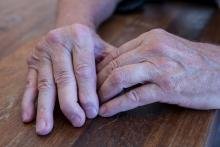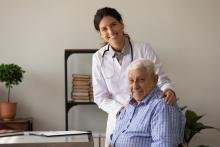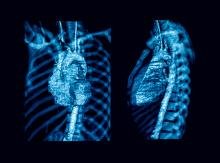With three oral presentations, this group of Argentine researchers address different pathologies, aspects, and follow-up of rheumatic patients through a three-year analysis with several publications.
Transcript
EF: Hello everyone and welcome to this series of videoblogs in which we will make a special coverage of what will be PANLAR 2021. We will be talking about these oral presentations that will be held in the framework of the Congress and we are with Dr. Rodrigo Garcia Salinas. Doctor, welcome.
RG: Thank you very much, Estefania. Thank you for the invitation and for the dissemination of this important congress.
EF: Tell us, doctor, what is this presentation, this oral paper that you are going to present at this PANLAR 2021 congress?
RG: Well, we have the honor of presenting three papers, our team from the Hospital Italiano de La Plata, I am here now in winter in the city of La Plata, Argentina, outside our hospital, recording for PANLAR. And yes, we are going to have three papers that are from our cohort of patients through a very innovative program that we generated here called Rheuma-check, which is a comprehensive management program for patients with joint pain, and one of the first papers that we are going to present is about how was the process of managing these patients during three years of development of the program, what percentage of diagnoses we made of diseases such as rheumatoid arthritis, psoriatic arthritis, what were the diagnoses of other arthropathies such as osteoarthritis, more than 1,000 patients were included in this study who went through our hospital and through this comprehensive management process.
And well, you can see how by working on clinical management, we were able to improve the screening of rheumatic diseases, to be able to attract more patients to the consultation and diagnose them earlier. I believe that this is one of the most relevant issues and why we were also able to obtain recognition as a PANLAR Center of Excellence in rheumatoid arthritis through this process and, well, we wanted to share our workflow with all our colleagues in Latin America.
Also, with this we will be able to see some special characteristics of these types of patients. Another oral work that is going to be presented is about the characteristics of patients with seronegative rheumatoid arthritis, those patients who do not have antibodies, therefore sometimes it is more difficult to detect or diagnose them early, and for that we draw on the experience of ultrasonography in our process, and through Dr. Santiago Ruta, who is an expert on the subject and who works with us in musculoskeletal ultrasound, he was able to demonstrate through work that patients with seronegative rheumatoid arthritis, those patients who do not have antibodies, therefore sometimes it is more difficult to detect them or diagnose them early, who is an expert on the subject and who works with us in musculoskeletal ultrasound, he was able to demonstrate through his work that patients with seronegative arthritis had a higher prevalence of articular tenosynovitis than patients with seropositive arthritis, and that is a differential characteristic that shows that perhaps all rheumatoid arthritis is not the same and we have to take a different approach.
And the third work has to do with psoriatic arthropathy and the investigation of early psoriatic arthropathy in this same circuit. What we could see is that there is always talk of screening for psoriatic arthritis from patients with psoriasis, in our case we screened them from the consultation of musculoskeletal pain, and we found that during these three years, with more than 700 patients evaluated, it was a little less, two and a half years, we found a frequency of psoriatic arthropathy of 10%.
They had the characteristic in relation to the other patients, higher frequency of psoriasis, frequency of relatives with skin psoriasis, but the other interesting thing is that we found radiological lesions in these patients who had less than one year of evolution, and we also found alterations in the musculoskeletal ultrasound, which speaks of an early involvement.
And the most interesting aspect of this work is that we have a cohort of patients who have not yet developed psoriatic arthritis, but they do have joint pain and a family history of psoriasis, that is, they are patients who are in the preclinical stage, so we must follow them very closely and, surely, we will have more information on this group of patients in a future PANLAR.
EF: We are talking about three years, how was the whole process throughout these years to get to these presentations that we will have in PANLAR 2021?
RG: Well, it is an arduous process that starts with a diagnosis of the situation of our center, from where the patients are, where we have to go to look for them, where we have to educate the professionals who refer them, and once they are able to arrive at the consultation, we can screen them and pass them through a circuit that allows the patient to have the diagnosis in less than 24 hours.
The truth is that at the beginning it was difficult because this is a work integration, not only doctors, but also nurses and hospital administrative personnel are involved, so we really work in a peer-to-peer team where no one is different in patient care, where the patient is at the center and this generates a quality contribution to the patient and we also obtain scientific data and we benefit the patient from every point of view, from the integral management of his pathology, from research to pathology and from teaching in pathology.
And this also generated many publications in international journals that are also published in Global Rheumatology, one of them on psoriatic arthritis, and some in other very important journals, and well, I think it has given us a lot of satisfaction as a team, but it also gives a lot of satisfaction to the patients.
EF: About this third work you told us about, which is still in a preclinical stage, what is going to follow? What is the next step in all this research?
RG: How interesting. We have the experience of evaluating preclinical rheumatoid arthritis, where we can have a group of patients that we have been following and seeing how they were developing the disease and how we could intervene early, the objective is the same, to try to avoid early damage, that these patients do not evolve into a more severe disease. To observe them and as soon as we find an indication that the disease is progressing, to take therapeutic attitudes, and in this period also to educate, so that this happens, to give hygienic, dietetic, and nutritional indications, so that the pathology does not progress and if, through clinical control with ultrasound, with specific therapeutic objectives of follow-up, we find that the disease has progressed, then to intervene therapeutically with drugs. In very early stages, it has been proven in many autoimmune diseases that these actions prevent complications of disability, cardiovascular risk, or mortality in the worst cases.
EF: Here we gave a small preview of what would be your presentation in PANLAR 2021, so leave the invitation to enter these sessions and to discover all this research that you are presenting with your team.
RG: Well, thanks to Estefania because it is a very important opportunity to invite all our colleagues from Latin America to join PANLAR, to be able to see these presentations in the oral sessions, I do not remember the days, but they are in the course of the congress, they will be able to enter the web, the complete program is already published. All the speakers are there, the truth is that it is a first class program, therefore not only my presentations, but everything it offers to walk for rheumatologist colleagues in training and for those of us who already have some years on the road, it is really spectacular, so we expect you all to share this and to be able to discuss it, and to meet in the networking, even if it is virtual we will be able to do it, and above all, thinking about the benefit of our patients.
EF: Doctor, thank you very much for your participation in Global Rheumatology's coverage of this congress.
RG: Thank you very much, Estefania, and again, many thanks to PANLAR for spreading the word and to Global Rheumatology.







